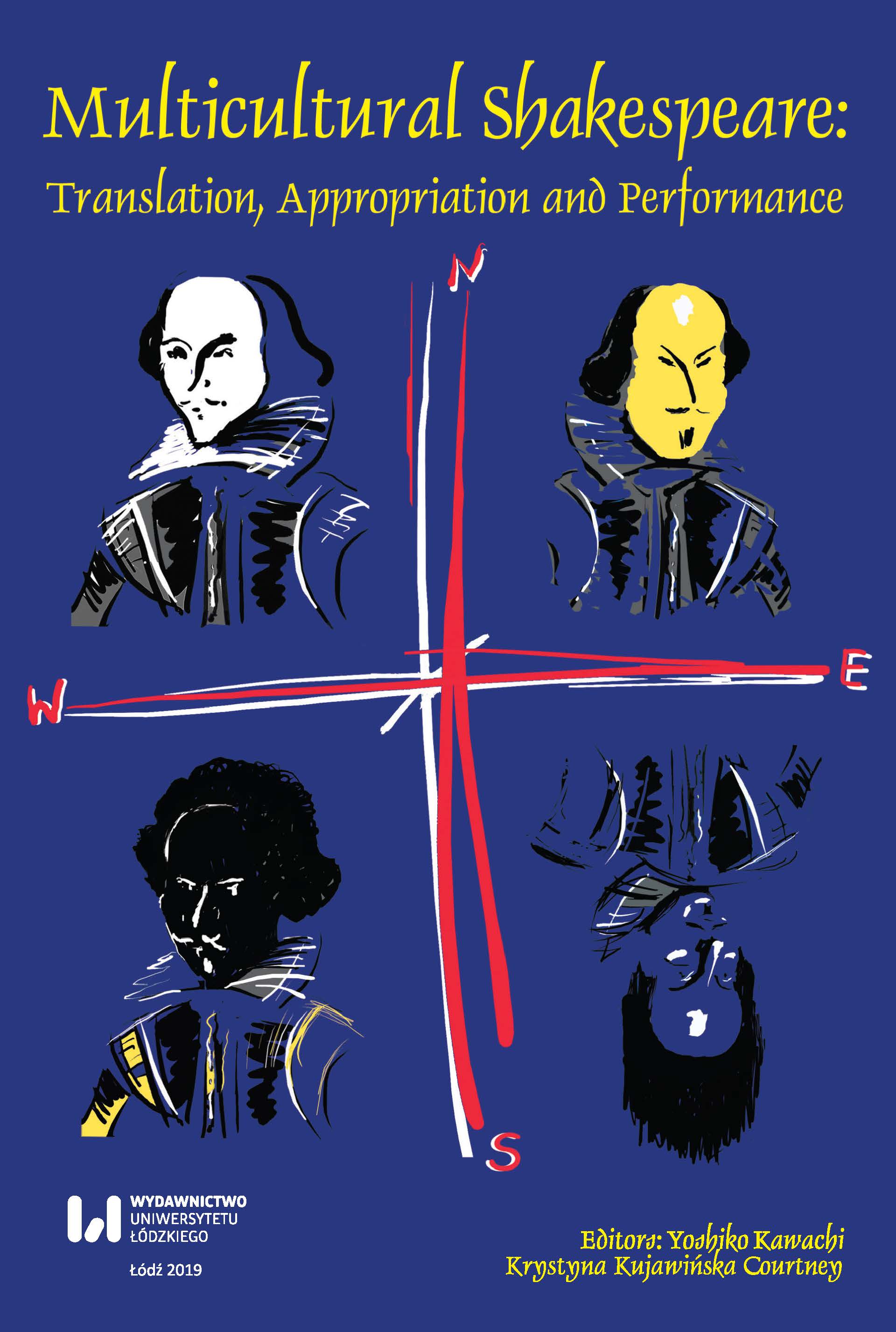Shakespeare across the Taiwan Strait: A Developmental Perspective
DOI:
https://doi.org/10.18778/2083-8530.20.09Keywords:
Shakespeare Studies, China, Mainland, Taiwan, Shake-xiquAbstract
Shakespeare studies in Mainland China and Taiwan evolved from the same origin during the two centuries after Shakespeare being introduced into China in the early nineteenth century. Although Shakespeare was first seen on the Taiwan stage in the Japanese language during the colonial period, it was after Kuomintang moved to Taiwan in 1949 that Shakespeare studies began to flourish when scholars and theatrical experts from mainland China, such as Liang Shih-Chiu, Yu Er-Chang, Wang Sheng-shan and others brought Chinese Shakespeare to Taiwan. Since the 1980s, mainland Shakespeareans began to communicate actively with their colleagues in Taiwan. With the continuous efforts of Cao Yu, Fang Ping, Meng Xianqiang, Gu Zhengkun, Yang Lingui and many other scholars in mainland China and Chu Li-Min, Yen Yuan-shu, Perng Ching-Hsi and other scholars in Taiwan, communications and conversations on Shakespeare studies across the Taiwan Strait were gradually enhanced in recent years. Meanwhile, innovations in Chinese adaptations of Shakespeare have resulted in a new performing medium, Shake-xiqu, through which theatrical practitioners on both sides explore possibilities of a union of Shakespeare and traditional Chinese theatre. This paper studies some intricate relationship in the history of Shakespeare studies in mainland China and Taiwan from a developmental perspective and suggests opportunities for positive and effective co-operations and interactions in the future.
Downloads
References
Chen, Fang. Shake-xiqu: Cross-cultural Adaptation and Interpretation. Taipei: Taiwan Normal University Press, 2012.
Google Scholar
Chen, Yilin. “A Study of Shakespeare’s Plays during the Japanese Colonization of Taiwan and Its Role in English Education (1895-1945).” Project Report of the National Science Committee of the Executive Council of Taiwan, 2010-2011.
Google Scholar
Chiu, Kun-liang. A Study on Taiwan Theatre during the Period of Japanese Occupation (1895-1945). Taipei: Culture Publishing Department of Independent Evening Newspaper, 1994.
Google Scholar
Chiu, Kun-liang. Drifting for Thousands of Miles: Chen Dayu. Taipei: Cultural Construction Committee of the Executive Council, 2006.
Google Scholar
Chiu, Mao-jing, and Beatrice Bi-qi Lei. “Shakespeare in Taiwan.” Electronic Bulletin of Taiwan Research Center, College of Humanities, Taiwan University http://ts.ntu.edu.tw/e_paper/e_paper_c.php?SID=63 27th April 2019.
Google Scholar
Hiroshi, Seto. Shakespeare in China: A Reception History of Chinese Shakespeare. Trans. Chen Linghong. Guangzhou: Guangdong People’s Press, 2017.
Google Scholar
Huang, C. Y. Alex (now Alexa Alice Joubin). Chinese Shakespeares: Two Centuries of Cultural Exchanges. New York: Columbia University Press, 2009.
Google Scholar
Huang, Yingzhe. “De-japanization” and “Re-sinicization”: Post-war Cultural Reconstruction 1945-1947. Taipei: Wheat Field Press, 2017.
Google Scholar
Hung, Shih-chian. “Immanent Exception: The Political Subject as a Generic Procedure.” Chung Wai Literary Quarterly 47.3 (2018): 57-88.
Google Scholar
Jiao, Tong. The Early Postwar Theatre in Taiwan. Taipei: Tai Yuan Press, 1990.
Google Scholar
Lei, Beatrice Bi-qi. “‘I May Be Straight, Though They Themselves Be Bevel’: Taiwan’s Early Shakespeare.” Shakespeare’s Asian Journey: Critical Encounters, Cultural Geographies, and the Politics of Travel. New York: Routledge, 2017. 89-108.
Google Scholar
Levith, Murray. Shakespeare in China. London: Continuum, 2004.
Google Scholar
Li, Huang-liang. Lee Man-gui. Taipei: Arts University of Taipei, 2003.
Google Scholar
Li, Kang-nian. Wang Shengshan. Taipei: Cultural Construction Committee of the Executive Council, 2006.
Google Scholar
Liang, Shih-chiu, ed. William Shakespeare: A Miscellany in Celebration of the 400th Anniversary of the Poet’s Birth. Taipei: The Institute of Compilation and Translation, 1966.
Google Scholar
Liu, Joyce C. H. “Why Badiou in Taiwan?” Chung Wai Literary Quarterly 47.3 (2018): 13-19.
Google Scholar
Lv, Su-shang. The History of Film and Theatre in Taiwan. Taipei: Hua Yin Press, 1961.
Google Scholar
Meng, Xianqiang. A Brief History of Chinese Shakespeare Studies. Changchun: Northeast Normal University Press, 2016.
Google Scholar
Meng, Xianqiang. “A Great Gathering of Shakespeare Studies: International Symposium on Shakespeare in China.” Sichuan Drama 2 (1999): 6-9.
Google Scholar
Meng, Xianqiang. Chinese Shakespeare Yearbook. Changchun: Northeast Normal University Press, 1995.
Google Scholar
Quiller-Couch, A. T. Historical Tales from Shakespeare. London: Edward Arnold, 1899.
Google Scholar
Shi, Wan-shun. “The Production of the Empire: Kawakami Otojiro’s Othello and Taiwan.” Art Review 1 (2008): 78-92.
Google Scholar
Teruo, Tarumoto, trans. Li Yanli. The Book on the Unjust Case of Lin Shu. Shanghai: Commercial Press, 2018.
Google Scholar
Trivedi, Poonam. Re-playing Shakespeare in Asia. New York: Routledge, 2010.
Google Scholar
Wu, Peichen. “Japanese Adaptation of Othello and the Colony Taiwan: Focusing on the Performance Records and Theatrical Reviews on Taiwan Daily News.” The Colony and the City. Ed. Chen Fang-ming. Taipei: Chengchi University Press, 2014. 39-52.
Google Scholar
Wu, Peichen. “The Peripheral Body of Empire: Shakespearean Adaptations and Taiwan’s Geopolitics.” Re-playing Shakespeare in Asia. Ed. Poonam Trivedi and Minami Ryuta. London: Palgrave Press, 2000. 235-250.
Google Scholar
Xu, Junya. “Research on Lin Shu and His works in Taiwan.” Chung Cheng Chinese Studies 1 (2012): 251-280.
Google Scholar
Xu, Junya. “The Early Propagation of Shakespeare’s Play and Its Acceptance in Taiwan.” Journal of Sichuan International Studies University 1 (2013): 42-46.
Google Scholar
Yamamoto, Sumiko. The Introduction of the Western Theatre to Japan. Tokyo: Bunka Shobō Hakubunsha, 1992.
Google Scholar
Yukari Yoshihara, “Raw-Savage’s Othello: The First-staged Japanese Adaptation of Othello (1903) and Japanese Colonialism.” Shakespeare and the Ethics of Appropriation, 2014.
Google Scholar
Zhu, Jungong. “On the Merits and Demerits of Zhu Shenghao’s Translation of Shakespeare’s Plays.” China Translation 5 (1998): 24-26.
Google Scholar
Downloads
Published
How to Cite
Issue
Section
License

This work is licensed under a Creative Commons Attribution-NonCommercial-NoDerivatives 4.0 International License.












